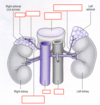The adrenal gland Flashcards
Where are the adrenal glands located?
Located on the superior pole of the kidney in the retroperitoneal space, each weighing ~4g in adults.
Identify the labels


What is the structure of the adrenal glands?
Similar to the pituitary, the adrenal gland is composed of two quite separate endocrine glands rolled into one structure
Adrenal medulla - 25%
Adrenal cortex - 75%

What is the adrenal medulla?
Neuroendocrine gland - it a modified sympathetic ganglion
It releases catecholamines from postganglionic cells:
mainly Epinephrine (adrenaline)
Norepinephrine
Dopamine
What is the adrenal cortex?
A true endocrine gland - which secretes 3 classes of steroid hormones:
Mineralocorticoids - eg Aldosterone
Glucocorticoids - eg Cortisol
Sex steroids - eg Testosterone
What do the hormones produced by the Adrenal cortex regulate?
Mineralocorticoids - eg Aldosterone:
- Involved in regulation of Na+, K+
Glucocorticoids - eg Cortisol:
- Involved in maintaining plasma glucose
Sex steroids - eg testosterone:
- do sex stuff
The adrenal gland produces hormones that play a role in the body’s response to _______
The body’s response to stress
Aldosterone and cortisol are essential for survival.
What are the histological regions of the adrenal glands (from out to in)
Capsule
Adrenal cortex:
- Zona Glomerulosa
- Zona Fasciculata
- Zona Reticularis
Adrenal Medulla
Identify the histological regions and what they secrete


Fill in the blanks about the adrenal cortex
“All steroid hormones are derived from ________, but different _______ are found in different adrenal zones, resulting in different end products e.g. enzymes needed to make aldosterone are found only in the zona _________”
All steroid hormones are derived from cholesterol, but different enzymes are found in different adrenal zones, resulting in different end products e.g. enzymes needed to make aldosterone are found only in the zona glomerulosa
Congenital defects in which enzyme are a common cause of adrenal hyperplasia?
What would be the effect of this?
21-hydroxylase
Results in the deficiency of cortisol and aldosterone - leading to disruption of salt and glucose balance.
Androgen biosynthesis is only viable pathway - leading to excessive adrenal androgen production
Describe how deficit of 21-hydroxylase causes adrenal hyperplasia?
- Lack of 21-hydroxylase inhibits synthesis of cortisol.
- This removes the negative feedback on ACTH and CRH release.
- Increased ACTH secretion is responsible for enlargement of adrenal glands.
- Negative feedback of ACTH on CRH synthesis remains.
- Babies become very ill within a few days of birth

What is cortisol?
A steroid hormone produced by the Zona Fasciculata of the adrenal cortex
It is a Glucocorticoid hormone than influences glucose metabolism
How does cortisol exist in the blood?
95% of plasma cortisol exists bound to carrier proteins called Cortisol binding globulin
Only free cortisol can cross into target cells
What cells does cortisol target?
Every fkn one of em
Every nucleated cell has cytoplasmic glucocorticoid receptors which bind to cortisol
What is the effect of cortisol binding to cytoplasmic receptors?
The cortisol/receptor complex moves to the nucleus
Binds to DNA via Hormone response element
Alters gene expression
Describe the daily release of cortisol
Cortisol release initiated by release of ACTH which follows a Circadian rhythm
Cortisol “burst” persists longer than ACTH burst because half-life is much longer
Peak is ~ 6-9am, nadir (lowest level) is ~ midnight

What is the effect of a lack of cortisol (ie if the adrenal glands were removed) on the body?
Loss of cortisol means animals cannot deal with stress, particularly in terms of maintaining blood glucose levels.
Cortisol as a glucocorticoid is crucial in helping to protect the brain from hypoglycaemia.
It has a permissive action on glucagon, which is vital as glucagon alone is inadequate in responding to a hypoglycaemic challenge
What is the effect of a lack of aldosterone on the body?
Lack of aldosterone would render an individual unable to regulate their extracellular fluid volume
What are the actions of cortisol (glucocorticoid action) on glucose metabolism?
Gluconeogenesis:
- Cortisol stimulates formation of gluconeogenic enzymes in the liver thus enhancing gluconeogensis and glucose formation
- This is aided by cortisols action on the muscle…
Proteolysis:
- Cortisol stimulates the breakdown of muscle protein to provide gluconeogenic substrates for the liver
Lipolysis:
- Cortisol stimulates lipolysis in adipose tissue which increases [FFA] plasma creating an alternative fuel supply that allows [BG] to be protected while also creating a substrate (glycerol) for gluconeogenesis
Insulin:
- Decreases insulin sensitivity of muscles and adipose tissue
Why is too much cortisol diabetogenic?
Cortisol acts to oppose insulin
What are the additional (non-glucocorticoid) actions of cortisol?
Negative effect on Ca2+ balance
Impairment of mood and cognition
Permissive effects on norepinephrine
Suppression of the Immune System
How does cortisol have a negative effect on Calcium balance?
Decreases absorption from gut
Increases excretion from kidney
Increases bone resorption (which is then excreted)
How does cortisol affect mood and cognition?
depression and impaired cognitive function are strongly associated with hypercortisolaemia.






